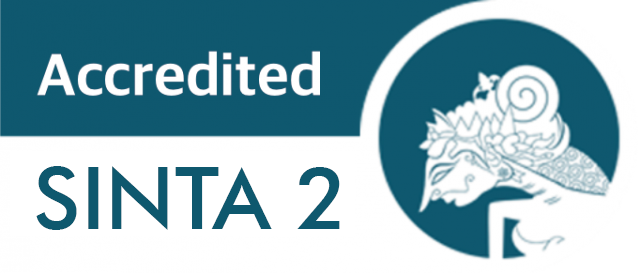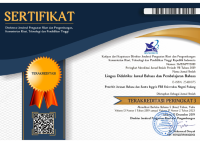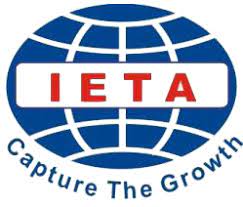The Voices of Alumni in Curriculum Development: A Step to Meet the Standards of the ASEAN University Network Quality Assurance (AUN-QA)
 ),
), (1) English Department FBS Universitas Negeri Padang
(2) Lecturer of Universitas Negeri Padang
 Corresponding Author
Corresponding Author
Copyright (c) 2017 Lingua Didaktika: Jurnal Bahasa dan Pembelajaran Bahasa
DOI : https://doi.org/10.24036/ld.v11i2.8092
Full Text:
 Language : en
Language : en
Abstract
One of some important things that the curriculum has or the primary objective of the curriculum itself is to meet the learning outcomes and target for the current needs and necessity. By designing the new curriculum and match it to the international standard of curriculum based on the Asean University Network Quality Assurance (AUN-QA), it expected that the needs of the students are achieved. However, the change of a curriculum cannot be carried out without the roles of Alumni as one of stakeholders. This article aimed to discuss the opinions and suggestions to the curriculum change from the alumni of English Department Faculty of Languages and Arts Universitas Negeri Padang as the Community who had experiences in seeking and staying for jobs both education and non education field. Under the guidance of need analysis theory, the questionnaires of needs of students were delivered to the several representatives of alumni. The findings showed that based on the some who had worked in education fields, from the four aspects of competence, the knowledge and skills of how to diagnose the students’ characteristics is needed and they have to have the skill in ICT, the knowledge about the trends in language teaching, and the attitude of how to use the language in a good way in social life is also needed. Then, for the personal competence, most of them agreed that the aspect of religion have to be had by the college students. From the other ones who work on the non-education fields, they suggested that the knowledge of how to report and analyze data is needed.
Key words: Curriculum Development, Needs of Students,
PERNYATAAN DARI ALUMNI DALAM PENGEMBANGAN KURIKULUM: SEBUAH TAHAPAN MENCAPAI STANDAR-STANDAR YANG DITETAPKAN OLEH ASEAN UNIVERSITY NETWORK QUALITY ASSURANCE (AUN-QA)
Abstrak
Mencapai kurikulum yang baik dan mengaitkannya dengan kebutuhan mahasiswa adalah suatu keharusan. Salah satu dari beberapa hal penting yang dimiliki kurikulum atau tujuan utama kurikulum itu sendiri adalah untuk mencapai hasil pembelajaran dan target kebutuhan saat ini. Dengan merancang kurikulum baru dan mencocokkannya dengan standar kurikulum internasional berdasarkan Jaminan Mutu Jaringan Asean (AUN-QA), diharapkan kebutuhan siswa tercapai. Namun, perubahan kurikulum tidak bisa dilakukan tanpa peran Alumni sebagai salah satu pemegang peranan penting. Artikel ini bertujuan untuk membahas pendapat dan saran terhadap perubahan kurikulum dari alumni Jurusan Bahasa Inggris Fakultas Bahasa dan Seni Universitas Negeri Padang sebagai Komunitas yang memiliki pengalaman dalam mencari pekerjaan baik di bidang pendidikan maupun non pendidikan. Berdasarkan teori analisis kebutuhan, kuesioner kebutuhan siswa disampaikan ke beberapa perwakilan alumni. Temuan menunjukkan bahwa beberapa orang yang pernah bekerja di bidang pendidikan, dari empat aspek kompetensi, pengetahuan dan keterampilan bagaimana mendiagnosis karakteristik siswa sangat dibutuhkan dan mereka harus memiliki keterampilan di bidang TIK (Kompetensi Pedagogik). Selain itu, pengetahuan tentang trend pengajaran bahasa juga dibutuhkan (Professional Competence). Apalagi sikap bagaimana menggunakan bahasa dengan cara yang baik dalam kehidupan sosial juga dibutuhkan (Social Competence). Kemudian, untuk kompetensi personal, kebanyakan dari mereka sepakat bahwa aspek agama harus dimiliki oleh mahasiswa. Dari para alumni yang bekerja di bidang non-pendidikan, mereka menyarankan agar pengetahuan tentang bagaimana melaporkan dan menganalisa data sangat dibutuhkan.
Kata kunci: Pengembangan Kurikulum, Kebutuhan Mahasiswa
Keywords
References
Chegeni, N & Nasrin, C. (2013). Language curriculum developmen and important of need analysis. ELT Voices-India: International Elctronic Journal for the Teachers of English, 3 (4): 1-13.
Ilomaki, L. (2008). The effect of ICT on school: teachers’ and students’ perspectives. Published Thesis. Turun Yliopisto: Finland
Hafizh, M, A & Ratmanida. (2008). Analisis kebutuhan bahasa inggris jurusan tata boga – PKK UNP Padang. Lingua Didaktika: Junal Bahasa dan Pembelajaran, 1 (2): 1-14.
Hayati, N, Utami, W, Suharmanto, Hidayati, M. (2015). Developing AUN-QA-based learning outcomes of English Language Teaching Study Programs. Makalah yang dipresentasikan di TEFLIN Conference, Bali
Kanning, U, P, Bottcher, W, & Herrmann, C. (2012). Measuring social competencies in the teaching profession-development of a self-assessment procedure. Journal for Educational Research, 4 (1): 140-154.
Mohammed, M & Abdullahi, M, S. (2015). The role of information and communication technology (ICT) in providing job opportunities for youth in the developing world. Journal of Emerging Trends in Engineering and Applied Sciences, 6(7): 174- 179.
Richards, J. C. (2001). Curriculum development in language teaching. NY: CUP.
Su, S, W. (2012). The various concepts of curriculum and the factors involved in curricula-making. Journal of Language Teaching and Research, 3 (1): 153-158.
Suharmanto, Maria, H, & Evynurul, L, Z. (2010). Improving the teaching and learning quality by developin AUN-QA-based course outlines. Bahasa dan Seni, 41 (2): 248-255.
Thakur, N. (2015). A study on implementation of techno-pedagogical skills, its challenges and role to release at higher level of education. American International Journal of Research in Humanities, Arts and Social Sciences, 9 (2): 182-186.
 Article Metrics
Article Metrics
 Abstract Views : 911 times
Abstract Views : 911 times
 PDF Downloaded : 251 times
PDF Downloaded : 251 times
Refbacks
- There are currently no refbacks.
Copyright (c) 2017 Lingua Didaktika: Jurnal Bahasa dan Pembelajaran Bahasa

This work is licensed under a Creative Commons Attribution-NonCommercial 4.0 International License.









